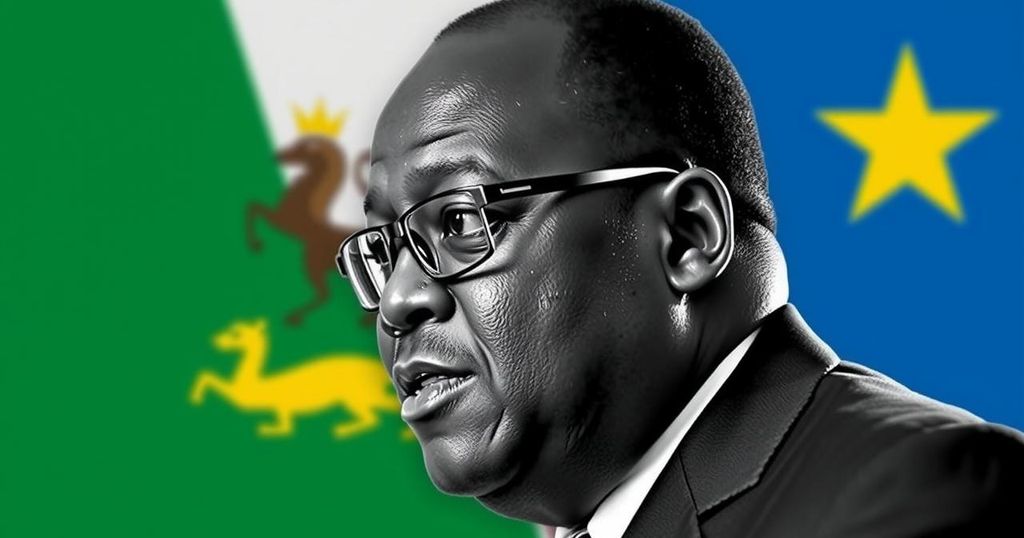Congo Considers Constitutional Revision Amidst Political Tensions
The Democratic Republic of Congo is deliberating a constitutional review that may allow President Felix Tshisekedi to extend his term in office. The proposal has elicited apprehension from opposition groups who fear that the changes will enable Tshisekedi to consolidate power. Previous resistance to constitutional amendments during Joseph Kabila’s presidency frames the current opposition’s stance, as they seek to prevent any alterations that might destabilize the nation.
The Democratic Republic of Congo is currently contemplating a constitutional review that could potentially impact President Felix Tshisekedi’s tenure. In recent statements, President Tshisekedi has expressed the urgent need for a constitution that aligns more closely with the realities and identity of the Congolese people, asserting that the current constitution, established in 2006, is inadequate as it was largely drafted by foreign entities. During his recent tour in Kisangani, he revealed plans to form a national commission composed solely of Congolese individuals from various professional backgrounds to reflect on and draft a new constitution. The opposition parties, however, view this initiative with skepticism, fearing it may be used as a mechanism for President Tshisekedi to extend his time in office. Historically, the opposition had previously resisted similar constitutional reforms during Joseph Kabila’s administration, suspecting that they were designed to prolong his presidency. Now, the political dynamic has shifted, with Tshisekedi’s party, the UDPS, advocating for constitutional amendments to better address the political challenges faced by the Congolese society. Despite the lack of explicit communication regarding potential changes to presidential term limits, there exists a perception among some UDPS leaders that Tshisekedi is, in reality, still within his initial term due to the necessary time taken for establishing governance and conducting elections. In response to concerns raised, President Tshisekedi clarified, “To change that, only the people can decide, not the president.” Critics, including major opposition figures such as Moïse Katumbi and Martin Fayulu, have vowed to staunchly resist any attempts to modify the constitution, asserting that such changes are intended to solidify Tshisekedi’s hold on power. They emphasize that the existing constitutional framework functions adequately and that the proposed revisions could destabilize the nation during an already tumultuous period. The Catholic Church has also voiced its concerns regarding potential revisions, warning that any constitutional changes could exacerbate the current instability. Ultimately, the opposition stands united against the constitutional amendment, while the ruling party grapples with internal consensus around this critical issue.
The context of this article centers on the ongoing discussions regarding the potential revision of the Congolese constitution, particularly under the leadership of President Felix Tshisekedi. Following a history of political upheavals in the DRC, including the previous regime of Joseph Kabila, the opposition remains vigilant concerning any movements that may permit a leader to extend their hold on power beyond established term limits. Hence, Tshisekedi’s aspirations for a revised constitution appear threatening to those who remember past attempts to manipulate governance structures for personal gain. Additionally, the backdrop of socio-political disturbance within the country adds urgency to these deliberations, with many factions emphasizing the need for stability and adherence to the existing laws.
In conclusion, the Congolese government’s consideration of a constitutional review has ignited a contentious debate between President Tshisekedi’s administration and opposition parties. While Tshisekedi champions the necessity for a constitution that resonates with Congolese nationalism, opposition leaders firmly oppose any changes that could facilitate an extension of presidential tenures. With potential repercussions for national stability hanging in the balance, the political landscape remains fraught as both sides prepare for impending conflicts over the constitution’s future.
Original Source: www.theeastafrican.co.ke




Post Comment